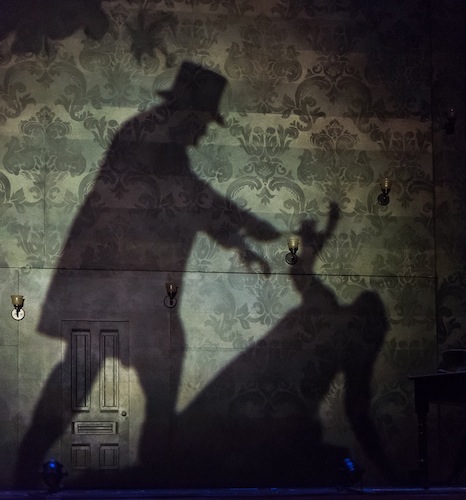COT to take a walk on the Gothic side with “Elizabeth Cree”

On some level, every opera is a fantasy. After all, most people don’t spend their days singing at one another.
But recently Chicago Opera Theater has been exploring even more explicitly fanciful worlds. Last February the company gave the world premiere of The Invention of Morel. Composed by ex-Police drummer Stewart Copeland, it was based on a 1940 sci-fi novella by Argentine writer Adolfo Bioy Casares.
This week COT presents another new work, Elizabeth Cree, music by Kevin Puts, libretto by Mark Campbell, based on Peter Ackroyd’s 1995 novel, The Trial of Elizabeth Cree. Set in London’s notoriously seedy Limehouse district in the late 19th century, the story involves Cree, a famous music hall star, accused of killing her husband, who may or may not have been a Jack-the-Ripper-type serial killer. Mixing imagined characters with such real-life figures of the era such as Karl Marx and English novelist George Gissing, the story follows the investigation of the Cree murder case.
During a recent interview with Campbell and stage director David Schweizer between COT rehearsals in the Studebaker Theater, Schweizer described the setting as “a Victorian dreamscape. It’s a mysterious space, as it should be.”
Running 90 minutes without intermission, the chamber opera is a co-production with Opera Philadelphia, which premiered it last September. One critic described Puts’ score as “blithely [seguing] from Felliniesque evocations of British music hall skits to Gothic horror melodrama.”
Campbell and Puts have collaborated on three operas and won the 2012 Pulitzer Prize in Music for their first venture, Silent Night, inspired by the so-called Christmas truce during World War I when enemy soldiers spontaneously put down their weapons and sang Christmas carols across the front lines. An opera based on Ackroyd’s Elizabeth Cree novel was Campbell’s idea. He was reading the novel on a train ride with Schweizer from New York to Dartmouth where both participated in a musical theater presentation.
“It was in 2005, I think,” said Campbell. “David asked me what I was reading, and I said it was the Ackroyd novel that I had had for ages and was dying to read. I said I dreamed of adapting the book but probably could never get the rights.” As it turned out, Schweizer and Ackroyd met decades before at the Yale Drama School very early in their careers and had stayed in touch. “I told Mark that Peter was a friend of mine” said Schweizer with a sly smile. “Getting the rights wouldn’t be a problem.”
Ackroyd’s novel bristles with flashbacks, and Campbell’s major problem was figuring out how to avoid confusing the audience. Schweizer and his production team—set and costume designer David Zinn and lighting/video designer Alexander V. Nichols—have set the action in four separate stage zones. At one moment we are in a drab police station, the next in a garishly lit London music hall. The action also plays out in a courtroom and the stately British Library reading room.
“I finally decided to use the spaces in the same sequence,” said Campbell. “The four settings follow in the same order three times. The scenes were already written. It was just a matter of arranging them in a way the audience could follow.”
After presenting Silent Night in 2012, said Puts in a phone interview from his home in New York, Opera Philadelphia asked him and Campbell to write a chamber opera.
“I was excited about the idea,” the composer said, “because it was so different from the larger scale of Silent Night. This would be a much more intimate experience.
“Mark suggested the Ackroyd novel, and after reading a few pages, I was instantly intrigued. There was something about the pace of it, the moving back and forth in time. The character of Elizabeth I found very interesting and complex. I also liked the idea of writing a piece that focuses on one character, though there are a lot of characters in the opera.”
Puts’s wide-ranging catalogue includes four symphonies and a cello concerto written in 2005 for Yo-Yo Ma. Campbell has written extensively for musical theater as well as opera. Last summer the Santa Fe Opera gave the premiere of The (R)evolution of Steve Jobs featuring Campbell’s libretto and a score by Mason Bates. Puts and Campbell, who also collaborated on a 2015 opera, The Manchurian Candidate, have worked smoothly together since the Minnesota Opera paired them up for Silent Night.
“I have complete respect for him as a musical storyteller and a composer,” said Campbell. “I’m up to writing librettos for 25 operas, and Kevin was shy at first. Silent Night was his first opera and he wasn’t sure what his role should be. But we just connected. We have a new project in the works, and I’m chomping at the bit.”
Though he’s been composing professionally for nearly two decades, Puts avoided writing an opera.
“It has its challenges,” he said, “but as soon as I started, I felt like I should have been doing it years before. It was such an amazing feeling, to have words at the piano and to react to those words, to just dream up the scene in music. It’s something I think I’ve always done, imagining scenes. There’s a narrative quality to all of my music. I’m a huge fan of film and film music, so as soon as I started [composing opera], there was a sense of excitement I hadn’t felt for a long time. It felt very natural.”
That excitement will be evident in Elizabeth Cree, whose pace is unrelenting. “There is no room between scenes,” said Schweizer.
“Kevin and I don’t want to waste time,” adds Campbell. “We want to keep it chugging along. I always tell my students, ‘Intellect kills opera. Emotion brings it to life.’”
Chicago Opera Theater’s production of Elizabeth Cree opens 7:30 p.m. Saturday and runs through February 18 at the Studebaker Theater. Chicagooperatheater.org
Posted in Articles




